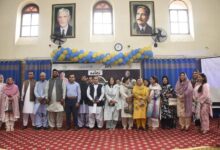The Response to COVID-19 Pandemic and its Impacts

Islamabad: CPDI “Assessment Report on Response to COVID-19 Pandemic” reveals the sever impacts in the wake of the eruption of the epidemic in the recent past. The study further shed light on the coordinated efforts of the government which resulted in a well-managed response to the pandemic proving as a rescuer for a larger portion of the population when the whole world was in severe crisis.
Quick and speedy provision of vaccination for all, massive awareness campaign drives, up-gradation of labs to Bio-Safety level 3, local community engagements in policymaking, mental health counseling during the pandemic, measures for ensuring marginalized community’s safety were recommended by the stakeholders in a policy dialogue organized by the Centre for Peace and Development Initiative (CPDI) in collaboration with the Common Wealth Foundation in Islamabad.
The dialogue aimed to share the findings of the assessment study and also recommend corrective actions where necessary in addition to issues faced by different segments of society in various regions of the country. A wide range of experts’ hailing from diverse backgrounds participated in the dialogue to coin recommendations based on the numeric of the study and chalk out a way forward for the policymakers to move on if there is another wave of calamity.
Speaking at the occasion Dr. Nisar Ahmad Cheema, member National Assembly opined the need of speedy response of government to halt the spread of the newly erupted omicron variant of Corona virus. Testing facilities at airports, up-gradation of labs, massive awareness campaigns for following SoPs, speedy supply of oxygen and PPEs are among the few to be observed, he added.
The experts in the dialogue unanimously agreed upon the following recommendations to be implemented immediately to cope with the new wave, which are as following;
- The process of development, approval and execution of schemes/policies must follow a fast track, taking all stakeholders onboard without compromising transparency.
- Health and education budget should be increased to better handle the issues caused by the pandemic.
- Primary healthcare should get its due share without any discrimination.
- Hospitals and health facilities must be fully equipped with separate wards for COVID-19 and other infectious diseases patients.
- Proper policies and procedures should be adopted for streamlining joint ventures of public and private sectors health facilities for coping with the pandemic situations like the one already faced.
- Drugs prices should be decreased, particularly in the wake of pandemic like situations for this purpose capacities of pharmaceutical staff should be enhanced. The policy on pricing, equitable access to medicines, reforms in imports, tax relief and rebates for local manufacturers should be reviewed to create an enabling environment for the local industry.
- The heroic deeds of the health staff during the pandemic must be recognized through rewards and enhanced remunerations.
- must prioritize health facilities and vaccination facilities for vulnerable population in order to nullify the challenges they are faced with during pandemic like situations.
- Serious efforts are required to increase the awareness level of public especially in rural areas to strive against the myths and superstitions associated with pandemic and precautionary measures.
- The government must take steps to counter the misinformation and disinformation against the COVID-19 vaccines and educate the masses against the myths and false assurances.
- Government must ensure equal access to vaccination facilities during the pandemic.
- Policy must be devised for recruitment of paid volunteers quickly for dealing with pandemic situation.
There was a consensus that coordination among various tiers of the government must be ensured to handle the pandemic efficiently and nullify its severity. Vaccination of women must be ensured with the same strategy as adopted for polio vaccination drive. The participants lauded the importance of a participatory approach for policy making especially in the crisis situation as it will restore the confidence of the layman on the power corridors on one hand while will prove beneficial in the identification of the issues of the neglected and marginalized communities on the other hand with proposals for their solution.




